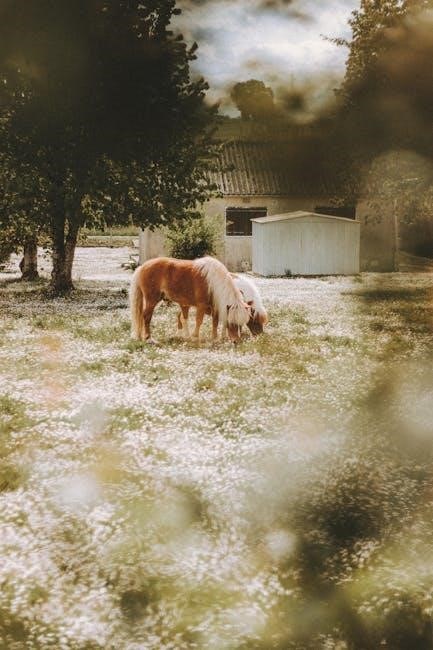Animal Farm: An Overview
Animal Farm, a satirical allegorical novella by George Orwell, was first published in England on August 17, 1945. The book tells the story of animals who rebel against their farmer, aiming to create an equal society.
Satirical Allegorical Novella
Animal Farm operates as both a satirical piece and an allegory. Orwell employs satire to critique political systems, particularly those that claim equality but devolve into oppression. The novella functions as an extended allegory, with animals representing figures and ideologies from the Russian Revolution. Through satire, Orwell exposes the hypocrisy and absurdity of totalitarian regimes, using animal characters to mock human flaws and political corruption. The allegorical nature allows readers to draw parallels between the animal society and historical events, providing a deeper understanding of the dangers of unchecked power. This blend of satire and allegory makes Animal Farm a potent critique of political ideologies.
Plot Summary
The plot revolves around farm animals who, inspired by Old Major, revolt against Farmer Jones. They establish a society based on equality but it gradually devolves into totalitarian rule under the pigs, led by Napoleon.
Animal Rebellion Against Farmer Jones
Driven to desperation by the neglect and cruelty of Mr; Jones, the animals of Manor Farm find inspiration in Old Major’s revolutionary vision. His dream of a society free from human oppression ignites a spark of hope within the farm’s inhabitants. The animals, fueled by their shared suffering and a yearning for a better life, unite under the principles of Animalism. This newfound solidarity emboldens them to challenge the established order, culminating in a daring and decisive rebellion. Overthrowing the drunken and incompetent Farmer Jones, the animals seize control of the farm, marking a pivotal moment of liberation and the dawn of a new era. This successful uprising sets the stage for their ambitious attempt to create a society founded on equality, freedom, and justice, as envisioned by Old Major.
Establishment of an Animal Society
Following their successful rebellion, the animals embark on the challenging task of establishing a new society based on the principles of Animalism. They rename Manor Farm to Animal Farm, symbolizing their break from human control and the beginning of their self-governance. The Seven Commandments of Animalism are inscribed on the barn wall, serving as the foundational laws of their utopian society. Initial efforts focus on collective farming, with animals working together to cultivate the land and provide for their needs. However, the seeds of discord are sown as the pigs, Napoleon and Snowball, vie for leadership, introducing power dynamics that threaten the ideals of equality. Despite these emerging tensions, the animals initially experience a sense of unity and optimism as they strive to build a better future for themselves, free from human exploitation.
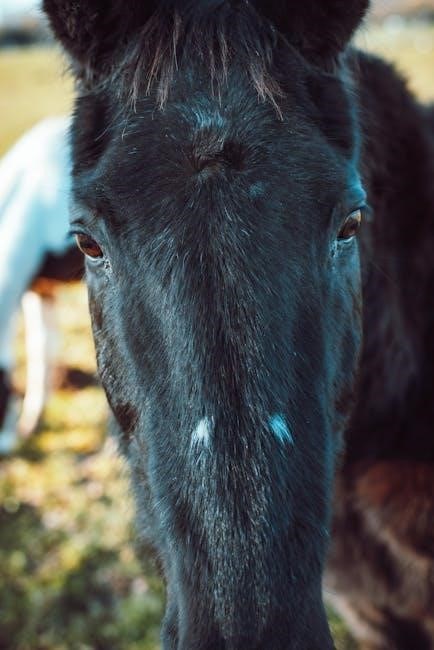
Themes in Animal Farm
Animal Farm explores themes of power, corruption, and equality. The novella satirizes political manipulation, the dangers of totalitarianism, and the abuse of power, reflecting the Russian Revolution and its aftermath.
Equality and Social Stratification
Animal Farm explores the initial idealistic vision of equality among all animals following their rebellion against Farmer Jones. This concept is central, as the animals strive to create a society where everyone is treated fairly and equally, free from human oppression and exploitation. However, as the story progresses, this ideal of equality gradually erodes, revealing the emergence of social stratification within the animal community.
The pigs, initially leaders of the revolution, begin to manipulate the other animals and consolidate power, ultimately creating a hierarchical system. Slogans like “All animals are equal” are twisted to justify the pigs’ privileged status, highlighting the corruption and betrayal of the revolution’s original goals. This distortion of equality demonstrates how power dynamics can undermine even the noblest intentions, leading to a society where some animals are “more equal than others.” The novella serves as a cautionary tale about the dangers of unchecked power and the fragility of egalitarian ideals.
Power, Corruption, and Manipulation
Animal Farm vividly portrays the corrupting influence of power, as the pigs, led by Napoleon, gradually seize control of the farm and exploit the other animals. The pigs’ initial promise of a utopian society devolves into a totalitarian regime marked by oppression and inequality. Through subtle and overt manipulation, the pigs rewrite history, control information, and exploit the animals’ labor for their own benefit.
Squealer, the pigs’ propagandist, is instrumental in manipulating the other animals’ perceptions of reality, using persuasive rhetoric to justify the pigs’ actions and suppress dissent. The pigs’ relentless pursuit of power ultimately leads to the abandonment of the revolution’s original principles, demonstrating how easily noble ideals can be corrupted by self-interest and the insatiable desire for control. Orwell masterfully illustrates the dangers of unchecked power and the vulnerability of the masses to manipulation.
Propaganda and Control
Animal Farm showcases the insidious nature of propaganda and its effectiveness in maintaining control over a population. The pigs, masters of deception, use propaganda to manipulate the animals’ perceptions of reality and justify their increasingly tyrannical rule. Squealer, the chief propagandist, employs persuasive rhetoric, distorted facts, and emotional appeals to convince the animals that the pigs’ actions are always in their best interests.
Through constant repetition and the rewriting of history, the pigs create a narrative that supports their power and suppresses dissent. The animals, lacking critical thinking skills and access to accurate information, become increasingly susceptible to the pigs’ propaganda. The use of slogans like “Four legs good, two legs bad” further simplifies complex issues and reinforces the pigs’ control over the animals’ thoughts and beliefs. Orwell highlights the importance of critical thinking and independent thought in resisting manipulation.
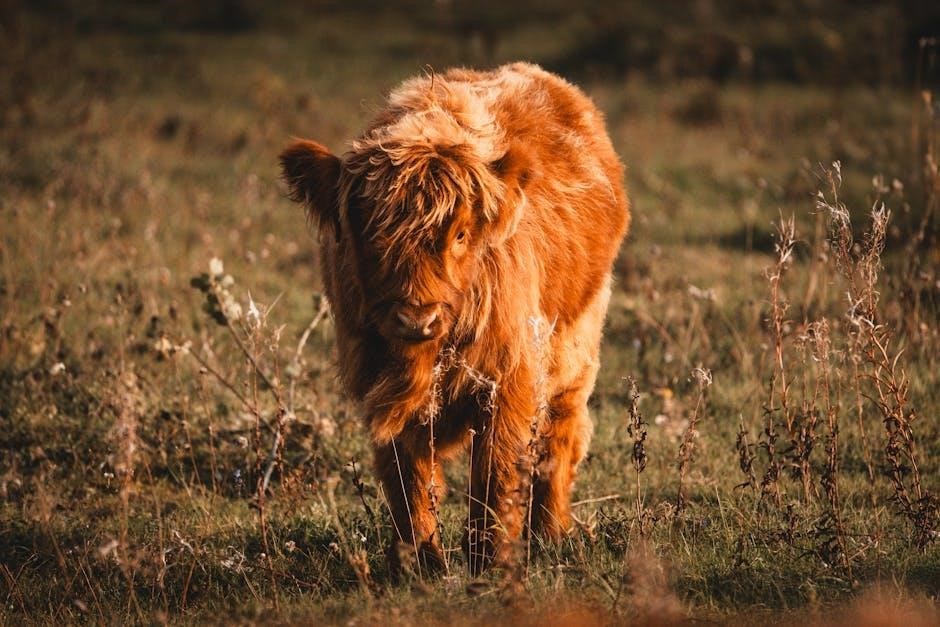
Characters
Animal Farm features a diverse cast of animal characters, each representing different aspects of society. From the idealistic Old Major to the power-hungry Napoleon, each character contributes to the story’s allegorical depth.
Old Major’s Vision
Old Major, the prize Middle White boar, plays a pivotal role in setting the stage for the animal revolution. He gathers all the animals to share a strange dream he had the previous night; This dream encapsulates his vision of a world where animals live free from human oppression, enjoying comfort and dignity. He speaks of England’s fertile soil and climate, capable of providing ample food for all animals.
Major’s stirring speech inspires the animals to aspire for a better life, free from the tyranny of Mr. Jones. His words ignite the flame of Animalism, the philosophy that drives the rebellion and shapes the animals’ initial goals. The animals capered with joy when they understood that the whips would disappear.
Napoleon and Snowball’s Leadership Struggle
Following Old Major’s death, Napoleon and Snowball emerge as the primary leaders of Animal Farm, but their conflicting visions soon lead to a power struggle. Snowball, advocating for progress and modernization, champions the construction of a windmill to improve the farm’s efficiency. Napoleon, on the other hand, prioritizes consolidating his power and uses manipulative tactics to undermine Snowball’s influence.
The rivalry between Napoleon and Snowball escalates, ultimately culminating in Napoleon’s violent expulsion of Snowball from the farm, with the help of trained dogs. With Snowball gone, Napoleon establishes himself as the supreme leader, ushering in an era of totalitarian rule and dismantling the initial ideals of Animalism. The playground of power, hierarchy, manipulation, hypnosis and slavery, begins.
Literary Devices
Orwell employs allegory and symbolism extensively in Animal Farm, using animals to represent figures and events from the Russian Revolution. This allows him to critique totalitarianism and explore themes of power, corruption, and social injustice.
Allegory and Symbolism
Animal Farm operates as a powerful allegory, where animals symbolize key figures and events from the Russian Revolution. The pigs, particularly Napoleon and Snowball, represent Stalin and Trotsky, respectively, embodying the power struggles within the Soviet Union. Manor Farm itself symbolizes Russia under the Tsarist regime, while the rebellion mirrors the Russian Revolution.
The windmill represents the industrialization efforts in Russia, and its destruction symbolizes the failures and setbacks faced during that period. The commandments of Animalism, initially representing equality, are gradually altered to reflect the pigs’ growing dominance and manipulation of the other animals. Squealer’s propaganda embodies the manipulation of information used by totalitarian regimes to control the populace.
Through these allegorical representations, Orwell critiques the corruption and betrayal of revolutionary ideals, highlighting the dangers of unchecked power and the importance of vigilance against manipulation;
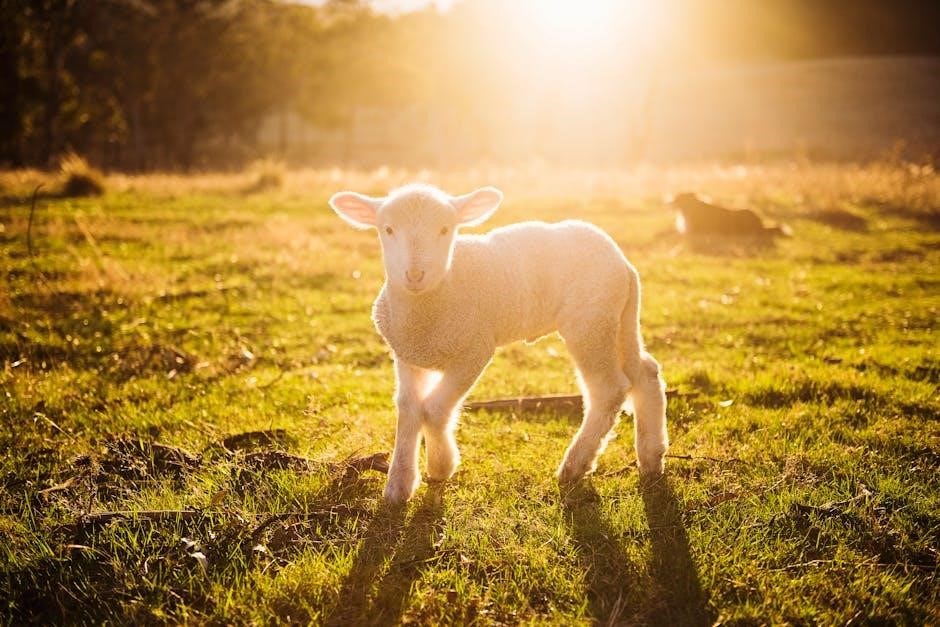
Historical Context
Animal Farm serves as a critique of the Russian Revolution and Stalinist Russia. Orwell uses the farm animals’ rebellion to mirror the events that led to the rise of totalitarianism.
Reflection of the Russian Revolution
Animal Farm is widely interpreted as an allegorical representation of the Russian Revolution and its aftermath. Old Major embodies Karl Marx and Lenin, inspiring the animals with the idea of a society free from human oppression, mirroring the communist ideology; The animals’ rebellion against Mr. Jones symbolizes the overthrow of the Tsarist regime.
The power struggle between Napoleon and Snowball reflects the conflict between Stalin and Trotsky. Napoleon’s eventual dominance and tyrannical rule symbolize the corruption of the revolution and the establishment of a totalitarian state. The pigs’ manipulation of language and propaganda mirrors the Soviet regime’s control over information. The other animals represent the working class, exploited and oppressed under a new form of tyranny. Ultimately, Animal Farm serves as a cautionary tale about the dangers of revolution and the potential for utopian ideals to be corrupted by power.
Legacy and Impact
Animal Farm‘s legacy endures through its insightful commentary on power, corruption, and social injustice. Its allegorical nature enables readers to apply its lessons to various political and social contexts, rendering it eternally relevant.
Enduring Relevance
Animal Farm‘s enduring relevance stems from its timeless portrayal of societal power dynamics and the cyclical nature of revolutions. Orwell’s allegorical novella continues to resonate with readers globally, offering a chilling reflection on the corruption of ideals. The novel serves as a potent reminder of the dangers inherent in unchecked authority and the seductive allure of utopian visions. Its themes of manipulation, propaganda, and social stratification remain strikingly pertinent in contemporary society, prompting critical examination of political systems and leadership. The animals’ descent into tyranny underscores the fragility of equality and the constant vigilance required to safeguard democratic principles. Animal Farm serves as a warning against complacency and blind faith in authority.
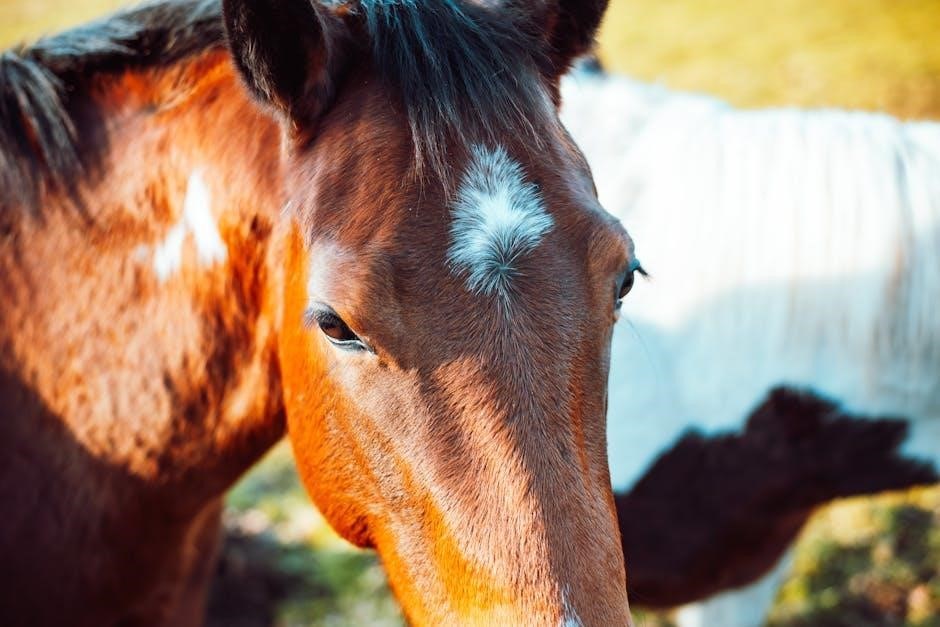
Downloadable PDF Versions
Animal Farm by George Orwell is widely available in PDF format for free download. These digital versions offer convenient access to the classic allegorical novella for reading on various devices.
Availability of Free eBooks
Numerous online platforms offer Animal Farm as a free ebook in PDF format, making it readily accessible to readers worldwide. These downloadable versions allow individuals to enjoy George Orwell’s allegorical novella on their computers, tablets, and smartphones, promoting wider readership and study. Many sites provide options for different font sizes and formatting preferences, enhancing the reading experience. Some platforms also include audio files alongside the text, catering to diverse learning styles. These accessible ebooks ensure that Animal Farm’s profound messages about power, corruption, and social inequality continue to reach new audiences, fostering critical thinking and sparking important discussions about society.
